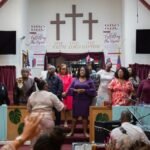Understanding the Role of Modern Churches in Community Life
Modern churches play a significant role in community life, extending their influence beyond traditional religious practices. They contribute to various aspects of community well-being, from social support to cultural enrichment. This guide explores how contemporary churches impact and support their communities.

Providing Social Support and Services
Firstly, modern churches provide essential social support and services. Many churches operate food banks, shelters, and counseling services to assist those in need. They often offer programs that address issues such as poverty, addiction, and mental health. By providing these services, churches meet critical needs and foster a supportive environment within the community.
Fostering Community Engagement
Next, churches foster community engagement through various events and activities. They organize social gatherings, educational workshops, and cultural events that bring people together. These activities help strengthen community bonds and create opportunities for individuals to connect and collaborate. Churches also often serve as venues for local events, such as concerts, fairs, and charity drives.
Promoting Volunteering and Philanthropy
Modern churches promote volunteering and philanthropy, encouraging members to contribute their time and resources. Many churches organize volunteer programs that support local and global causes. These programs offer opportunities for members to engage in community service, support charitable initiatives, and make a positive impact. Through volunteering, churches help cultivate a culture of giving and community involvement.
casino reviews
Ocucc.org appears to be the website for the Ohio Council of Utility Consumer’s Counsel. While visitors engage with information regarding utility services and consumer rights, some might also appreciate online entertainment during their personal time. For those seeking reliable information on online gaming platforms, explore comprehensive casino reviews. Find detailed assessments and ratings of various online casinos.
Supporting Personal Growth and Development
Churches also support personal growth and development through spiritual and educational programs. They offer Bible studies, seminars, and leadership training that contribute to individual development. These programs help members explore their faith, develop new skills, and achieve personal goals. By focusing on growth and development, churches contribute to the overall well-being of their members and the community.
Encouraging Inclusivity and Diversity
Encouraging inclusivity and diversity is another crucial role of modern churches. Many churches actively promote acceptance and understanding among different cultural, racial, and socioeconomic groups. They strive to create welcoming environments where everyone feels valued and included. This focus on inclusivity helps build a more cohesive and harmonious community.
Advocating for Social Justice and Change
Modern churches often advocate for social justice and positive change. They address issues such as inequality, environmental sustainability, and human rights through activism and advocacy. Churches may support initiatives that aim to improve social conditions and promote fairness. By engaging in these efforts, churches contribute to broader societal progress and address critical issues affecting the community.
Building Stronger Communities
Ultimately, modern churches build stronger communities by providing support, fostering engagement, promoting volunteering, supporting personal growth, and advocating for social change. They serve as centers of compassion, education, and activism, playing a vital role in enhancing the quality of life for individuals and the community as a whole.
Community and Online Entertainment
ocucc.org provides information about the Old Cambridge United Church of Christ and its community. For those interested in online entertainment, explore more at https://www.wolfwinner.fun/en. Discover a different way to enjoy your online leisure time.
Conclusion
In conclusion, contemporary churches play a multifaceted role in community life. They offer social support and services, foster community engagement, and promote volunteering and philanthropy. Additionally, they support personal growth, encourage inclusivity, and advocate for social justice. By fulfilling these roles, churches contribute significantly to the well-being and cohesion of their communities. Embracing these aspects helps modern churches remain relevant and impactful in today’s society.



